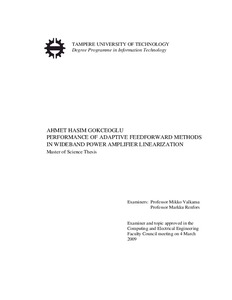Performance of Adaptive Feedforward Methods in Wideband Power Amplifier Linearization
Gokceoglu, Ahmet (2009)
Gokceoglu, Ahmet
2009
Master's Degree Programme in Information Technology
Tieto- ja sähkötekniikan tiedekunta
This publication is copyrighted. You may download, display and print it for Your own personal use. Commercial use is prohibited.
Hyväksymispäivämäärä
2009-10-07
Julkaisun pysyvä osoite on
https://urn.fi/URN:NBN:fi:tty-201007071255
https://urn.fi/URN:NBN:fi:tty-201007071255
Tiivistelmä
The waveforms of the emerging communication systems aiming at high data rates and high spectral efficiencies are becoming more and more complex and thereon also sensitive to many implementation nonidealities. One good example is multicarrier waveforms having high peak- to-average power ratio (PAPR) and thus high sensitivity to any nonlinearity in the radio components such as transmitter power amplifier (PA). On the other hand, when emphasizing power efficiency, power amplifiers operate typically close to their saturation region and are thus heavily nonlinear. Such power efficient operation is especially important in handheld terminal equipment but also on the base-station side of, e.g., cellular systems. Thus efficient linearization of power amplifiers is seen as one essential element in obtaining proper compromise between power efficiency and spectral efficiency in the emerging communications systems.
Various approaches have been proposed and demonstrated for power amplifier linearization in the literature, among which the so-called feedforward approach is one of the most established ones. Feedforward linearizer builds on two stages, the so-called signal cancellation loop (SCL) and error cancellation loop (ECL), which aim at isolating and subtracting the distortion created by the PA from the overall linearizer output. In practice, however, the operation of feedforward linearizer is susceptible, e.g., to any parameter mismatches in the SCL and ECL components. Also the characteristics of the PA can change in time when the operating conditions or operating point are varying.
Adaptive feedforward linearizer is a promising linearization method that is able to adjust the signal cancellation loop and error cancellation loop coefficients to minimize the effects of component mismatch and to track the possible variations in the characteristics of the circuit components. In this thesis, the performance of least-mean squares (LMS) adaptation in terms of steady-state SCL and ECL coefficient behavior and the corresponding suppression of inter- modulation distortion (IMD) are studied, covering both memoryless PA's and PA's with memory. The analysis shows that the adaptive feedforward linearizer is independent from memory effects in terms of IMD suppression even though convergence of SCL coefficient is affected by memory. An estimate for the final IMD suppression is driven for the memoryless amplifier model and it also holds for the model with memory under reasonable assumptions. The findings of the analysis are supported with simulation results. /Kir10
Various approaches have been proposed and demonstrated for power amplifier linearization in the literature, among which the so-called feedforward approach is one of the most established ones. Feedforward linearizer builds on two stages, the so-called signal cancellation loop (SCL) and error cancellation loop (ECL), which aim at isolating and subtracting the distortion created by the PA from the overall linearizer output. In practice, however, the operation of feedforward linearizer is susceptible, e.g., to any parameter mismatches in the SCL and ECL components. Also the characteristics of the PA can change in time when the operating conditions or operating point are varying.
Adaptive feedforward linearizer is a promising linearization method that is able to adjust the signal cancellation loop and error cancellation loop coefficients to minimize the effects of component mismatch and to track the possible variations in the characteristics of the circuit components. In this thesis, the performance of least-mean squares (LMS) adaptation in terms of steady-state SCL and ECL coefficient behavior and the corresponding suppression of inter- modulation distortion (IMD) are studied, covering both memoryless PA's and PA's with memory. The analysis shows that the adaptive feedforward linearizer is independent from memory effects in terms of IMD suppression even though convergence of SCL coefficient is affected by memory. An estimate for the final IMD suppression is driven for the memoryless amplifier model and it also holds for the model with memory under reasonable assumptions. The findings of the analysis are supported with simulation results. /Kir10
